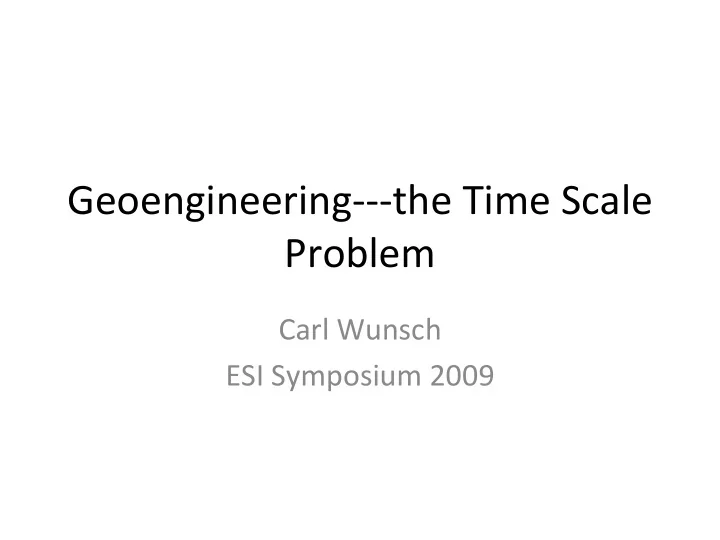

Geoengineering ‐‐‐ the Time Scale Problem Carl Wunsch ESI Symposium 2009
Consider the Titanic. (The Commissioner.) “I am rather interested about that. Do you mean to say that if this ship had driven on to the iceberg stem on she would have been saved? “ [` stem on’ means `head on’ ] “I am quite sure she would, My Lord. I am afraid she would have killed every firemen [sic] down in the firemen's quarters, but I feel sure the ship would have come in. " British Wreck Commissioners's Inquiry, 1912, Day 19. Testimony of Edward Wilding. Includes discussion of whether they were negligent in the response to sighting of the iceberg. (They put the ship into a hard ‐ turn and backed down on the engines. Has been suggested that with full engine power, they would have turned faster ‐‐‐ enough to have missed the berg.) (linked through Wikipedia) “Don’t just do something, stand there.” For the officer on deck watch, would have required great strength of mind to have done nothing!
Even comparatively simple, nonlinear systems do not always behave intuitively. Consider vaccination against an epidemic such as measles: Vaccination starts. Incidence declines. Anderson and May, 1983, J. Hygiene
Incidence starts to increase. Government panic. Overshoot and oscillation…..Essential to understand the time scales and the time to equilibrium.
How much do we know about the climate system? Enough to control it? The geological record is not so easy to interpret and many of its features are the subject of fierce controversy. But some elements are sufficiently robust that few people would argue:
• The climate of the past has often been very different from that of today. • There have been major glaciations occurring roughly every 80 ‐ 120,000 years over the last million years. (But no fundamental understanding of cause(s) beyond a probable, but very indirect, link to orbital changes.) • Today’s Earth is, geologically speaking, warm by the standards of the last 1 million years, but not so warm by the standards of longer time scales. (Over most of Earth history, there have been no continental glaciers such as we have today.) • Both CO2 and temperature have undergone large excursions that show some degree of correlation at sufficiently long time scales.
Not much else is without controversy.
• The main problem is that we understand the modern system to be remarkably complicated. (The most complex of all scientific problems because it involves, not just fluid, gas and particle physics and chemistry, but most of biology, solar physics, geology, glaciology, …., future human conduct. Indeed, what can be omitted?)
Probably the longest instrumental record in existence 25 y What 25 or 50 year interval is indicative?
Honolulu Tide Gauge Record (mms) No particular interval of less than about 50 years is representative. What happens after 200 years?
? ?
Understood? Tipping points?
Some of the intrinsic timescales of climate change . Human population doubling To origins of oceans, atm. oxygen, life; continental drift, evolution, weathering chemistry,…
Ice sheet time scales ‐‐‐ one piece of the overall system (courtesy, P. Heimbach): • Minutes to hours: – wave/ice ‐ shelf interaction from swell, tides, calving icebergs – stick/slip behavior of ice motion (revealed from seismography) • Weeks: – Larsen B ice shelf break ‐ up 2002 (WAIS) • Monthly to seasonal: – Speedup/slowdown of Greenland outlet glaciers – seasonal accumulation • Inter ‐ annual to multi ‐ decadal/centennial(?): – Speedup/slowdown of Greenland outlet glaciers – Speedup/slowdown of West Antarctic ice streams • Multi ‐ centennial: – Speedup/slowdown of West Antarctic ice streams – circumpolar deep water (CDW) age reaching the Antarctic ice shelves • Multi ‐ millennial: – surface ‐ to ‐ bottom heat conduction – ice sheet deglaciation
Glacier flow speeds Glacier flow speeds • Jacobshavn Isbrae (Greenland): 10 km/yr • Thwaites (Antarctica): 3km/yr • Ice sheet interior: O(0.1) km/yr Rignot & Thomas
• Who would claim to understand any physical system from observations of a fraction of the dominant time scale. Ocean surface gravity waves have periods around 1 second. How would you respond to a field program to study them lasting for 0.1 s? How about 1000(1s) ?
The study of climate is evidently an inter ‐ generational problem and one unlikely to be adequately understood by any of the generations present here today. The records are simply not long enough, the system is highly nonlinear in some components, and what we see happening today involves complex interacting components with time scales extending from seconds to billions of years. Those components are present today from past disturbances and would be excited and modified by new disturbances.
Some Conclusions Scientific knowledge is in a very primitive state—adequate to define (some of) the risks. Inadequate to make predictions of what will happen if nothing is done, nor if something is done. The analogy to treatment of a terminal cancer patient by some heroic, untried, drug is probably a good one. “Nothing to lose.” But who gets to decide? Not even clear always with a single patient. Who decides for the whole world?
• What do you do when you don’t know enough to determine the outcome of your intuitively plausible actions? • This is not a science question.
Climate change will be with us for decades, and most likely hundreds of years. We are unlikely to understand it well enough to control it for a very long time. The main priority then becomes rendering it possible for future generations to exercise control based upon greatly enhanced understanding. An intergenerational problem. Technology is extremely unlikely to come to the rescue at any foreseeable time.
In the meantime, study the system; study the control options; but----take precautions (mitigation), prepare for adaptation, and do nothing that is even possibly irreversible (which may be almost anything, including of course, the ongoing injection of greenhouse gases).
Thank you.
Recommend
More recommend